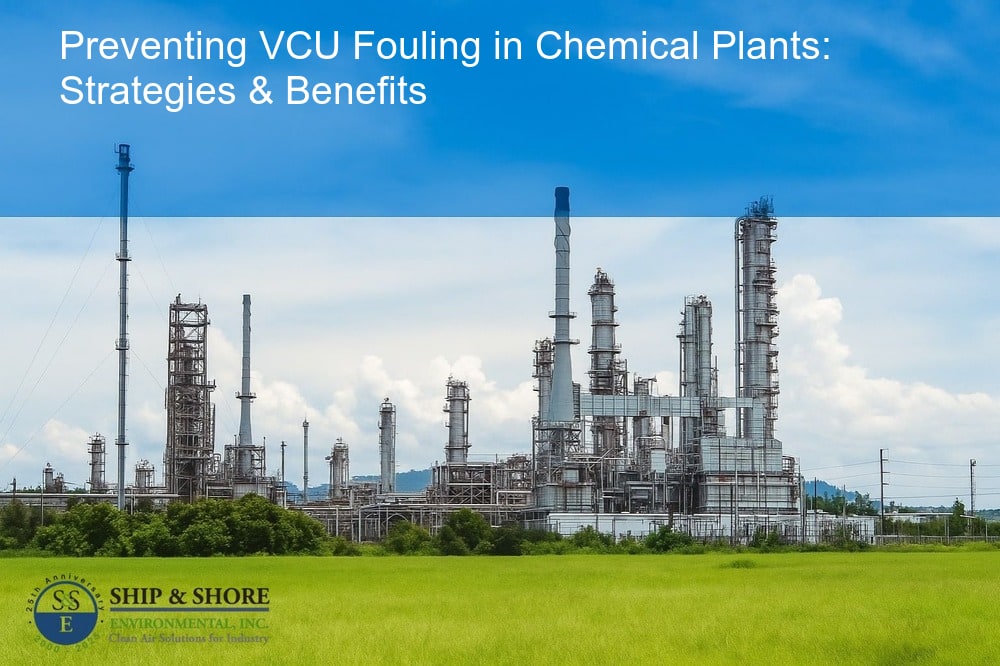
Preventing VCU Fouling in Chemical Plants: Best Practices & Benefits
November 5, 2025 5:49 amUnderstanding VCUs: An Essential Component in Chemical Plants
Vapor Combustion Units (VCUs) play a critical role in the effective operation of chemical plants. VCUs are used to safely volatilize and combust industrial process emissions, ensuring the volatile organic compounds (VOCs) and other hazardous pollutants are broken down. This not only aids in regulatory compliance but also contributes to maintaining a healthier environment. Given their crucial function, preventing VCU fouling in chemical plants is of paramount importance to ensure both operational efficiency and safety.
The Problem of VCU Fouling: Overview and Impact in Industries
VCU fouling represents a significant challenge within the chemical industry. Fouling occurs when particulate matter, chemical deposits, or other residues accumulate on the internal surfaces of the VCU. This buildup obstructs the flow of emissions, reduces the efficiency of combustion, and can lead to increased emissions of harmful pollutants. Furthermore, fouling can lead to unscheduled downtimes, increased maintenance costs, and even system failures if left unchecked. The cumulative impact on operational efficiency, environmental compliance, and financial performance can be substantial, making it vital to address and mitigate fouling issues proactively.
Importance of Preventing VCU Fouling in Chemical Plants
In a sector where reliability and efficiency are critical, preventing VCU fouling in chemical plants is not just about maintaining operational stability; it is about enhancing the overall longevity and performance of the plant’s infrastructure. Strategic fouling prevention and management help in avoiding unexpected shutdowns, reducing costly maintenance intervals, and sustaining the efficacy of pollution control measures. This proactive approach also aligns with environmental best practices, ensuring that chemical plants adhere to stringent regulatory standards while minimizing their ecological footprint.
Delving Deeper: How Does VCU Fouling Occur in Chemical Plants?
VCU (Vapor Combustion Unit) fouling, a prevalent issue in chemical plants, arises due to the accumulation of unwanted materials on the internal surfaces of combustion units. This phenomenon usually results from chemical reactions between the combustion gases and residual particles. Over time, these deposits harden, reducing the VCU’s efficiency and causing operational disruptions. These challenges not only lead to unscheduled downtime but also escalate maintenance costs. Moreover, the adverse environmental impacts due to inefficient combustion and increased pollutant emissions make it critical for us to address this issue proactively.
Strategies and Techniques for Preventing VCU Fouling in Chemical Plants
Preventing VCU fouling in chemical plants requires a multi-faceted approach. A combination of regular maintenance, advanced technology, and meticulous operational protocols can significantly reduce the incidence of fouling. Here are some strategic steps we can implement:
- Regular Maintenance and Cleaning: Scheduled maintenance checks and thorough cleaning of VCU systems ensure the removal of any deposits before they become problematic.
- Advanced Filtration Systems: Utilizing state-of-the-art filtration systems can effectively minimize the entry of particulates that contribute to fouling.
- Chemical Additives: Introducing specific chemical additives can prevent the formation of hard deposits, thus maintaining system efficiency.
- Temperature Control: Implementing precise temperature control mechanisms can help in maintaining optimal combustion conditions, reducing the likelihood of fouling.
- Operational Training: Ensuring that our operational staff are well-trained on best practices for combustion processes can significantly reduce human error-related fouling.
Case Study: Effective Practices in VCU Fouling Prevention
To illustrate the efficacy of these strategies, consider a recent case study from one of our chemical plants. This plant, notorious for high fouling rates, implemented a rigorous VCU maintenance program complemented by advanced filtration technology. Additionally, the plant introduced targeted chemical additives to combat specific deposit formations.
The results were remarkable. Within six months, the plant experienced a 30% reduction in operational downtime due to VCU fouling. Furthermore, emissions dropped significantly, contributing to substantial compliance with environmental regulations. This case underscores that our proactive approach to VCU maintenance and fouling prevention not only enhances operational efficiency but also yields environmental and financial benefits.
By consistently applying these strategies, we can mitigate the adverse impacts of VCU fouling and lead our chemical plants towards a more sustainable and efficient operational model.
Did you know? Preventing VCU fouling in chemical plants significantly boosts efficiency and complies with environmental standards, reducing plant downtimes and maintenance costs.
The Long-term Benefits of Preventing VCU Fouling
Preventing VCU fouling in chemical plants is not just a practice but a long-term investment in efficiency and sustainability. By maintaining the optimal performance of Vapor Combustion Units, we significantly reduce the risk of operational shutdowns, thereby saving costs associated with unscheduled maintenance and repairs. Consistently clean VCUs ensure that emissions are treated effectively, contributing to cleaner air and a healthier environment. Additionally, when we invest in preventative measures, we prolong the lifespan of our equipment, ensuring that each unit operates at its peak for as long as possible, further optimizing our capital expenditure.
Moving Towards a More Efficient and Environmentally Compliant Chemical Plant
A forward-thinking approach to managing VCUs involves prioritizing their upkeep as central to our environmental compliance strategy. When we actively focus on preventing VCU fouling in chemical plants, we demonstrate our commitment to meeting stringent regulatory requirements and reducing our carbon footprint. This proactive stance not only helps us avoid penalties and fines but also strengthens our reputation as an industry leader in sustainability. Furthermore, by ensuring our vapor combustion systems function seamlessly, we contribute to a more efficient chemical production process, maximizing output while minimizing waste.
Final Thoughts on the Importance of VCU Fouling Prevention in the Chemical Industry
As we reflect on the various aspects of vapor combustion unit maintenance, it becomes clear that preventing VCU fouling in chemical plants is crucial for both operational excellence and environmental stewardship. By implementing robust prevention strategies, we can safeguard our operations against disruptions while simultaneously advancing our sustainability goals. It is through this dual focus on efficiency and eco-friendliness that we can continue to push the boundaries of what is achievable in the chemical industry. In closing, let us remain vigilant and proactive in our maintenance practices to ensure a brighter, more sustainable future for all.
FAQ
What exactly is VCU fouling and why is it significant?
VCU fouling refers to the accumulation of unwanted materials on the surfaces of Vapor Combustion Units, which can lead to a decline in performance and efficiency. It’s significant because it can cause operational issues, increased emissions, and potential regulatory compliance problems. Furthermore, consistent fouling can necessitate costly maintenance and can shorten the lifespan of the equipment.
How can chemical plants effectively prevent VCU fouling?
Effective prevention of fouling in vapor combustion units involves regular maintenance, monitoring of the feedstock for contaminants, and the application of anti-fouling technologies. By adopting a comprehensive maintenance regime, chemical plants can ensure the long-term reliability and efficacy of their VCUs. Additionally, employing the latest advancements in anti-fouling techniques can provide an extra layer of protection.
What are the environmental benefits of maintaining a clean VCU?
A clean VCU operates more efficiently and is paramount in controlling emissions, thereby helping the chemical plant to meet environmental regulations. Subsequently, this leads to less pollution and a safer environment. Moreover, the improved operation of VCUs can contribute to reduced energy consumption, showcasing our commitment to sustainability.
Can VCU fouling affect the bottom line of a chemical plant?
Certainly, fouling in VCUs can have a substantial impact on the financial health of a chemical plant. The increased maintenance costs, potential shutdowns due to reduced capacity or equipment failure, and even fines due to non-compliance with environmental standards can all affect the bottom line. Therefore, proactive fouling prevention is vital for maintaining profitability and operational excellence.
What role does VCU fouling prevention play in the sustainability of chemical plants?
VCU fouling prevention is integral to the sustainability goals of chemical plants. By ensuring that VCUs operate efficiently, plants not only conserve energy but also minimize waste and reduce harmful emissions. Effectively, this translates to a more environmentally friendly production process and supports our mission to promote a more sustainable industry. Through these efforts, we are moving towards a greener, more responsible future in chemical manufacturing.
Categorised in: Blog

